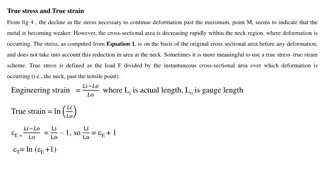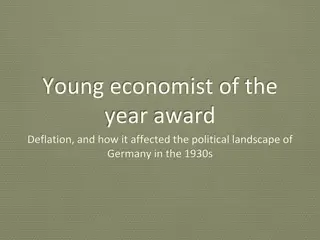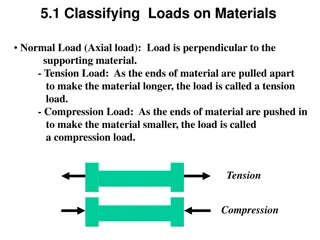Impact of the Ruhr Occupation in 1923: Economic Crisis and Political Strain
The French occupation of the Ruhr in 1923 exacerbated the economic challenges faced by the Weimar Republic, leading to hyperinflation and increased tensions with France and Belgium. Germany's struggles to pay reparations, coupled with the occupation of crucial industrial areas, intensified the crisis. The decision to print more money to meet obligations resulted in a rapid devaluation of the currency. The occupation also saw German civilians facing imprisonment and food shortages for non-compliance.
Download Presentation

Please find below an Image/Link to download the presentation.
The content on the website is provided AS IS for your information and personal use only. It may not be sold, licensed, or shared on other websites without obtaining consent from the author.If you encounter any issues during the download, it is possible that the publisher has removed the file from their server.
You are allowed to download the files provided on this website for personal or commercial use, subject to the condition that they are used lawfully. All files are the property of their respective owners.
The content on the website is provided AS IS for your information and personal use only. It may not be sold, licensed, or shared on other websites without obtaining consent from the author.
E N D
Presentation Transcript
Learning Outcomes To investigate events surrounding the occupation of the Ruhr in 1923 To consider the impact of the occupation
Events in the Ruhr The problems facing the Weimar Republic worsened in 1923 due to the French occupation of the Ruhr and effects of hyperinflation
Economic problems: the 1923 crisis Germany were expected to pay reparations of 6,600 million at 100 million per year. The Weimar claimed that it could not pay The Allies did not believe that the Germans could not afford to pay - especially France where anger towards Germany still ran deep.
Economic problems: the 1923 crisis The German government was accused of trying to get out of paying the reparations. This was only four years after the end of the war, and Britain and France still did not trust Germany.
Economic problems: the 1923 crisis The Weimar government began to print more money in order to pay France and Belgium as well as its own workers The value of the currency started to drop rapidly
Economic problems: the 1923 crisis In 1921 Germany failed to make a reparation payment and so France sent troops into the Ruhr, Germany's main industrial area The Ruhr is sited in the Rhineland so there we no German troops to stop the invading troops.
Invasion A further occupation by French and Belgium troops took place in January 1923 when Germany failed again to pay reparations to both these countries The French and Belgium troops took over the iron and steel factories, coal mines and railways.
Invasion Those Germans who lived in the Ruhr and did not do as the French told them to were imprisoned. Food was taken
Response from the German Government The Weimar government ordered the workers in the Ruhr to go on strike and it ordered all people in the Ruhr to passively resist the French and Belgium soldiers. They were not to openly confront the French and Belgium soldiers, but they were not to help them in any way whatsoever. This led to violence and over the next 8 months of the occupation, 132 people were killed and over 150,000 Ruhr Germans expelled from their homes.
Germany economy suffers The order for workers to go on a general strike may have been patriotic but it had disastrous consequences for Germany as a whole. The Ruhr was Germany s richest economic area and produced a great deal of wealth for the country as a whole. The huge Krupps steelworks was there. By not producing any goods whatsoever, Germany s economy started to suffer. The striking workers had to be paid and the people expelled from their homes had to be looked after.
Germany economy suffers To pay the striking workers and look after the homeless the government did the worst thing possible - it printed money to cover the cost. This showed other countries that Germany did not have enough money to pay for her day-to-day needs. Whatever money which had been invested in Germany was removed by the foreign investors.
Hyperinflation This drop in confidence also caused a crisis in Weimar Germany when prices started to rise to match inflation. Very quickly, things got out of control and what is known as hyperinflation set in.
Hyperinflation Prices went up quicker than people could spend their money. In 1922, a loaf of bread - 163 marks. By September 1923, this figure had reached 1,500,000 marks. At the peak of hyperinflation, November 1923, a loaf of bread cost 200,000,000,000 marks.
Look at both posters carefully. Which poster do you think is British and which is German? Explain your choice.
Here I am Here I stay What can we see in the background? Which country does the figure portray? What is written behind the women? What is she sitting on?
Which country does the figure portray? What is she holding? What does the military helmet represent? What type of buildings can you see? How important were they to Germany after the war?
Study the source below and then answer the question which follows. Source B [A British cartoon from Punch 1923, the writing translates Here I am Here I stay ] What was the purpose of Source B? [8] [Use details from Source B and your own knowledge and understanding of the historical context to answer the question.]























